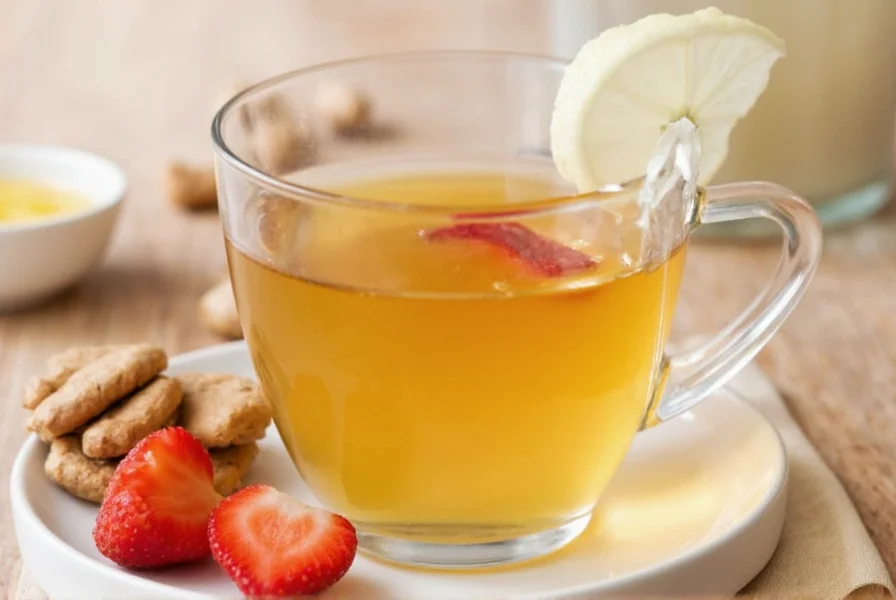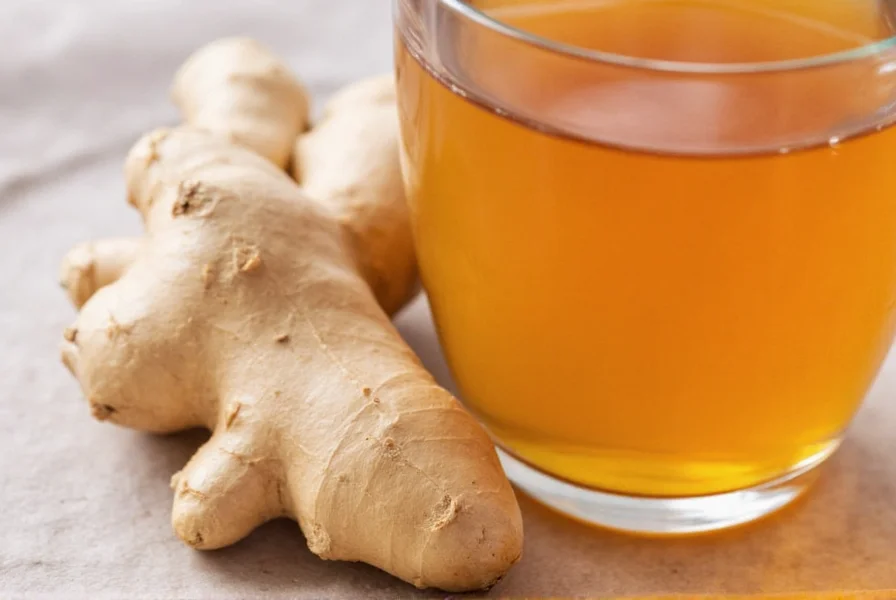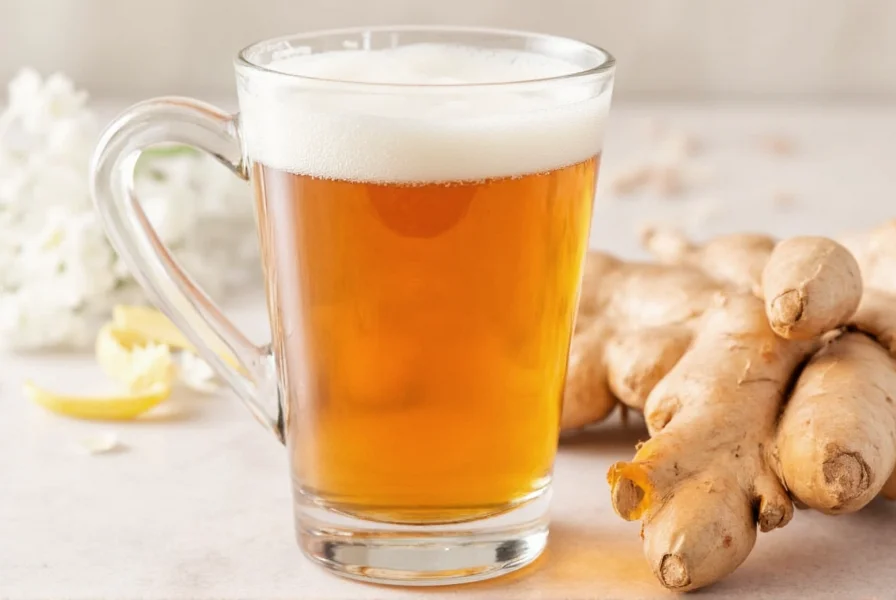Acid reflux affects millions worldwide, prompting many to seek natural remedies like ginger tea. Understanding whether this traditional remedy actually works requires examining both scientific evidence and practical considerations. This comprehensive guide explores what current research reveals about ginger tea's potential effects on acid reflux symptoms, proper preparation methods, and important precautions to consider.
Understanding Acid Reflux and Ginger's Potential Role
Acid reflux occurs when stomach acid flows back into the esophagus, causing that familiar burning sensation known as heartburn. The lower esophageal sphincter (LES), which normally prevents this backflow, becomes weakened or relaxes inappropriately. While conventional medications effectively manage symptoms for many, some people prefer natural approaches like ginger tea for acid reflux relief.
Ginger (Zingiber officinale) contains bioactive compounds, particularly gingerols and shogaols, which have demonstrated anti-inflammatory and antioxidant properties in scientific studies. These compounds may influence digestive processes in ways that could potentially benefit those with mild acid reflux. Research published in the Molecular Research and Food Nutrition journal indicates ginger may accelerate gastric emptying, which theoretically could reduce the opportunity for acid to reflux.
Scientific Evidence on Ginger Tea for Acid Reflux
While direct studies specifically examining ginger tea's effects on acid reflux are limited, several relevant research findings provide insight:
| Study | Findings Related to Digestion | Relevance to Acid Reflux |
|---|---|---|
| 2005 study in Euro. Rev. Med. and Pharm. Sci. | Ginger reduced nausea and accelerated gastric emptying in participants | Faster gastric emptying may reduce reflux episodes |
| 2011 research in Molecular Nutrition & Food Research | Ginger compounds inhibited gastric contractions that contribute to nausea | Potential to stabilize digestive processes |
| 2019 review in Nutrients | Ginger demonstrated anti-inflammatory effects on gastrointestinal tract | May reduce esophageal irritation from acid exposure |
It's important to note that these studies primarily examined ginger's effects on nausea, gastric motility, and inflammation rather than specifically measuring acid reflux symptoms. The connection to acid reflux relief remains theoretical and based on ginger's broader digestive benefits.
How Ginger Tea Compares to Other Natural Remedies
When considering natural approaches for acid reflux management, understanding how ginger tea stacks up against other popular options provides valuable context. Unlike peppermint tea, which can actually relax the LES and potentially worsen reflux for some people, ginger appears less likely to negatively affect sphincter function.
Compared to alkaline water or baking soda solutions that temporarily neutralize stomach acid, ginger tea works differently by potentially improving overall digestive function rather than directly altering stomach pH. This makes ginger tea for acid reflux a potentially gentler, longer-term supportive option rather than an immediate symptom stopper.
Preparing Effective Ginger Tea for Acid Reflux Relief
Not all ginger teas deliver the same potential benefits. For those exploring ginger tea as a natural remedy for acid reflux, preparation matters:
- Fresh ginger root: Using 1-2 inches of fresh ginger root, sliced or grated, provides higher concentrations of active compounds than many commercial tea bags
- Brewing time: Steep for 5-10 minutes in hot (not boiling) water to extract beneficial compounds without making the tea too strong
- Temperature: Drink warm rather than hot to avoid additional esophageal irritation
- Timing: Consume 20-30 minutes before meals may support digestive preparation
- Frequency: Limit to 1-2 cups daily to assess tolerance

Potential Side Effects and Important Precautions
While many find ginger tea beneficial, it's not universally helpful for acid reflux. Some individuals may experience worsened symptoms because:
- Ginger can stimulate stomach acid production in certain people
- Those with ulcers or severe GERD might find it irritating
- High concentrations may cause stomach upset in sensitive individuals
- Ginger interacts with blood thinners and certain diabetes medications
People with gallstones should consult their doctor before regularly consuming ginger tea, as it may increase bile production. Pregnant women should limit ginger intake to no more than 1 gram daily from all sources unless otherwise directed by their healthcare provider.
When to Seek Professional Medical Advice
Natural remedies like ginger tea for acid reflux shouldn't replace professional medical care, especially when experiencing:
- Frequent heartburn (more than twice weekly)
- Difficulty swallowing
- Unintended weight loss
- Chest pain that radiates to the arm or jaw
- Symptoms that persist despite lifestyle changes and over-the-counter treatments
Chronic acid reflux could indicate gastroesophageal reflux disease (GERD), which requires proper diagnosis and treatment to prevent complications like esophagitis or Barrett's esophagus. A healthcare provider can determine whether ginger tea might complement your specific treatment plan or if other approaches would be more appropriate.
Integrating Ginger Tea into a Comprehensive Acid Reflux Management Plan
For those who tolerate it well, ginger tea can be one component of a broader approach to managing acid reflux symptoms. Consider combining it with other evidence-based strategies:
- Elevating the head of your bed during sleep
- Avoiding large meals before bedtime
- Identifying and eliminating personal trigger foods
- Maintaining a healthy weight
- Quitting smoking if applicable
Remember that individual responses to ginger tea for acid reflux relief vary significantly. Keeping a symptom diary while introducing ginger tea can help determine whether it provides personal benefit or potentially worsens your symptoms.
Conclusion: A Balanced Perspective on Ginger Tea for Acid Reflux
Ginger tea shows promise as a potential complementary approach for managing mild acid reflux symptoms, primarily through its anti-inflammatory properties and potential to support healthy digestion. However, the scientific evidence remains limited and primarily indirect. What works for one person might not work for another, and in some cases, ginger could potentially exacerbate symptoms.
Approach ginger tea as one possible tool in your acid reflux management toolkit rather than a guaranteed solution. Pay attention to your body's response, start with small amounts, and consult with a healthcare professional—especially if you have chronic symptoms or take medications. When used thoughtfully as part of a comprehensive approach, ginger tea may provide soothing relief for some individuals seeking natural options for acid reflux management.

Frequently Asked Questions
How quickly does ginger tea work for acid reflux relief?
Responses vary among individuals. Some people report feeling relief within 15-30 minutes of drinking ginger tea, while others may need consistent use over several days to notice benefits. Ginger works differently than antacids—it supports digestive function rather than immediately neutralizing stomach acid, so effects may be more gradual.
Can ginger tea make acid reflux worse for some people?
Yes, ginger tea might worsen acid reflux symptoms in certain individuals. While ginger generally supports digestion, it can stimulate stomach acid production in some people, potentially exacerbating reflux. Those with ulcers or severe GERD may be more likely to experience negative effects. If you notice increased heartburn after drinking ginger tea, discontinue use and consult your healthcare provider.
What's the best time to drink ginger tea for acid reflux management?
For potential acid reflux benefits, drink ginger tea 20-30 minutes before meals to support digestive preparation. Some people also find relief by drinking a cup in the evening if symptoms tend to worsen at night. Avoid drinking ginger tea right before lying down, as this could potentially trigger reflux. Start with one cup daily to assess your tolerance before increasing frequency.
How does fresh ginger tea compare to store-bought ginger tea for acid reflux?
Fresh ginger tea typically contains higher concentrations of active compounds like gingerols compared to many commercial tea bags. When preparing ginger tea for acid reflux relief, using 1-2 inches of fresh ginger root steeped in hot water generally provides more potent benefits than pre-packaged options. However, some high-quality organic ginger tea bags can still offer benefits if fresh ginger isn't available.
Can I drink ginger tea while taking prescription medications for acid reflux?
In most cases, yes—you can safely drink ginger tea while taking prescription acid reflux medications like PPIs or H2 blockers. However, ginger may interact with certain medications including blood thinners and diabetes drugs. Always consult your healthcare provider before adding ginger tea to your routine if you're taking any prescription medications, especially if you have underlying health conditions.











 浙公网安备
33010002000092号
浙公网安备
33010002000092号 浙B2-20120091-4
浙B2-20120091-4